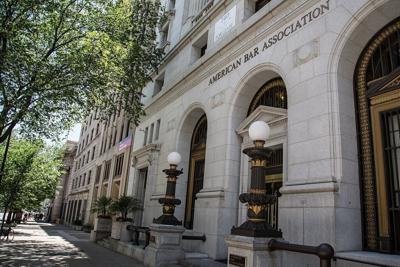
American Bar Association offices, Washington, D.C.
CHICAGO - The American Bar Association, a national organization that helps to set ethical and professional standards for lawyers and judges, has argued in court that it should be free to use race to decide how it awards scholarships, saying the ABA has a First Amendment right to use its money to "advocate for diversity in the legal profession."
On June 16, the ABA filed a brief in federal court in Chicago in support of its attempt to dismiss a lawsuit accusing the organization of discriminating against white law school students in doling out certain scholarships.
"The ABA has a clearly defined goal of eliminating bias and enhancing diversity in the legal profession, as reflected in its publicly available materials published on its website," the ABA wrote in its brief.
"In operating (the Legal Opportunity Scholarship Fund), the ABA strives to convey a message consistent with that goal: that it seeks to encourage students from traditionally underrepresented racial and ethnic backgrounds to apply to law school, and to provide financial assistance for them to do so.
"This is expressive conduct that is protected by the First Amendment."
The filing came in response to a lawsuit brought by the group known as the American Alliance for Equal Rights, a conservative legal advocacy group which has filed numerous high profile lawsuits in recent years against governments, law firms, and other businesses and organizations, generally accusing them of anti-white or anti-heterosexual discrimination.
In the lawsuit against the ABA filed in April, the AAER accused the ABA of illegally discriminating against white students under its Legal Opportunity Scholarship Fund. Under LOSF, the ABA for more than two decades has awarded $15,000 annual scholarships to students beginning law school. However, to be eligible for a LOSF scholarship, applicants must be a member of a non-white racial or ethnic minority group, including black, Latino, Native American or Asian.
In addition to satisfying the ABA's desired racial and ethnic criteria, LOSF scholarship applicants are also evaluated based on "personal statements" and personal and family finances, among others.
However, the AAER noted that only 39% of ABA LOSF scholarship recipients are considered to be "first in their family to attend college."
In its lawsuit, the AAER notes that white students are ineligible to apply for the scholarship, "regardless of financial need, academic achievement, or any other factor."
"The ABA’s scholarship thus rests on racial stereotypes, using whiteness as a proxy for advantage and minority status as a proxy for disadvantage," the AAER said in its complaint.
In the complaint, the AAER notes that the ABA drafts model rules of professional conduct for attorneys, "including the one barring lawyers from 'discrimination on the basis of race.'"
"But instead of opposing racial discrimination, the ABA practices it," the AAER said in its complaint.
In filing the complaint, the AAER asserted the ABA has improperly continued its discriminatory scholarship program even after the U.S. Supreme Court ruled in 2023 that "race-based admissions in higher education" are illegal under federal civil rights law, no matter the race of those receiving preference or being discriminated against.
And they noted in their complaint that the race-based scholarships are in keeping with the ABA's practice of requiring law schools to "'demonstrate by concrete action,' a commitment to diversity, 'particularly racial and ethnic minorities,'" in order to maintain their accreditation.
Further, the AAER noted the ABA has opposed "efforts to expand" the Supreme Court's decision "to justify the elimination of diversity, equity, and inclusion programs in all sectors," and has criticized "race-blindness" for “ignor[ing] historic systemic challenges that have created disparate opportunities for marginalized communities.”
The AAER claimed it was filing suit on behalf of unidentified white law school students, who are members of the AAER, who claim they have been discriminated against under the ABA's LOSF scholarship program.
In response to the lawsuit, the ABA has filed its motion to dismiss.
In the motion, the ABA claims the AAER lacks standing to press the lawsuit, as the ABA claims the AAER cannot claim they are filing suit on behalf of anyone actually harmed by the LOSF scholarship program's use of race to award funds, because the unidentified white law school students never actually applied for a LOSF scholarship or contacted the ABA to inquire about it.
The ABA also asserted the AAER cannot sue for discrimination over the use of race to determine scholarship eligibility because, they say, no one has a legal or contractual right to any scholarship funds, which are "discretionary gifts" awarded by the ABA.
Finally, the ABA argued the lawsuit should be dismissed because the ABA has a constitutional right to use race to award scholarship funds in pursuit of the organization's mission to increase racial diversity in the ranks of the American legal profession.
In support of its contention, the ABA pointed to a 2024 decision in New Jersey state court ruling in which the court determined the New Jersey State Bar Association was legally allowed to discriminate against white people and others in "reserving seats on its leadership bodies for members of historically underrepresented groups."
In the ruling, the New Jersey court determined that forcing the New Jersey State Bar Association "to end this practice would 'unconstitutionally infringe its ability to advocate the value of diversity and inclusivity in the (New Jersey State Bar Association) and more broadly in the legal profession.'"
"Accordingly, the court concluded, the state’s interest in eliminating discrimination, while compelling, did not justify a 'severe intrusion' of 'prohibiting the Association from expressing views protected by the First Amendment,' including 'the value of demographic diversity in the legal profession,' " the ABA wrote in its filing, describing the New Jersey ruling.
"... The same is true here," the ABA said. "As AAER’s own complaint acknowledges, the ABA is an advocate for diversity in the legal profession. It is the ABA’s First Amendment right to express its views on this issue, and to engage in expressive conduct consistent with its views—including by awarding scholarship funds to LOSF participants."
U.S. District Judge Joan Gotschall has not yet ruled on the ABA's dismissal request, and the AAER has not yet responded in court.
The ABA is represented by attorneys Joseph J. Torres and Katherine M. Funderburg, of the firm of Jenner & Block, of Chicago.
The AAER is represented by attorneys Matt Pociask, Thomas R. McCarthy, Cameron T. Norris and R. Gabriel Anderson, of the firm of Consovoy McCarthy, of Arlington, Virginia; and Adam K. Mortara, of LawFair LLC, of Nashville, Tennessee.


